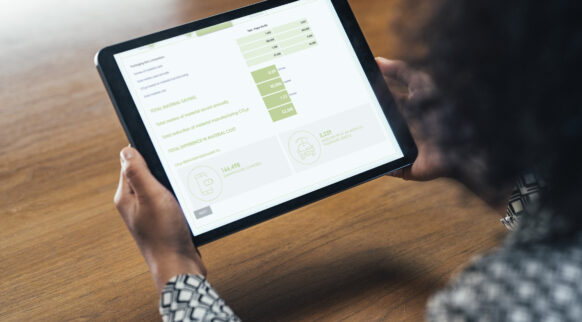
Eco-friendly Packaging Products
Explore Macfarlane’s extensive range of eco-friendly packaging products including, plastic-free packaging, recycled content packaging and recyclable packaging.
Our Extended Producer Responsibility (EPR) frequently asked questions will answer what you need to know about EPR and if it will apply to you. Click the button below to download the free PDF version of the FAQs or read through the questions below.
These FAQs are intended as a guide only. They were last updated in May 2023, in line with Government guidance on the Extended Producer Responsibility scheme at the time. As this is a new and evolving piece of legislation, it is recommended you check this document regularly for updates, as well as the UK Government website.
If you need further information, contact Macfarlane Packaging or visit the UK Government website for more information.
Download our EPR FAQ Fact SheetExtended Producer Responsibility (EPR) is a new signature piece of legislation that will see the full cost of managing household packaging waste shift from taxpayers to producers.
It is a reform of the existing UK Packaging Waste Regulations that were established in 1997 and, whilst fees do not commence until 2024, businesses are now legally obliged to be collecting new datasets with reporting on that data being mandated from October 2023.
Producers will be taxed to pay the costs of managing household packaging waste with fees being modulated over time, to further incentivise the use of recyclable packaging. These will be payable through new EPR fees which will be levied in addition to PRNs (Packaging Waste Recycling Notes) fees.
By December 2024, eligible businesses will also need to report “Nation Data”, providing further information, including what nation of the United Kingdom that their packaging is anticipated to become waste.
Extended Producer Responsibility forms part of the Government’s strategy to protect the climate, drive green growth, and drive down unnecessary waste.
Shifting the cost responsibility of processing waste from households to producers is set to encourage a more circular economy, where producers will reuse and recycle more packaging throughout its lifecycle.
The overarching principle behind Extended Producer Responsibility is that the polluter should pay for the waste that they create in society and the Government are therefore implementing this change to force the packaging industry to pick up this cost.
There are some key differences between EPR and historic Packaging Waste Regulations.
At the moment, responsibility for packaging waste is spread across multiple points in the supply chain. However, under new Extended Producer Responsibility regulations, the responsibility is placed on one producer.
In addition, the financial burden of processing packaging waste will move from council tax waste systems to the responsible producers. Funds raised by the EPR scheme will be redistributed to local authorities by the scheme’s appointed administrator.
Funds raised by the current Packaging Waste Regulations are only used to subsidise UK recycling. Under the new EPR scheme, the full net cost of all elements of packaging processing will be covered. This will include everything from collection, sorting and treatment of packaging waste.
So, in summary, some of the key changes are:
The concept of EPR is about ensuring the producers bear responsibility for the environmental impact of the packaging they produce. At the heart of the scheme is the opportunity to consider the whole lifecycle of packaging and how it is managed at end of life.
The scheme will work by making responsible businesses report on the packaging they produce, and they will pay fees based on their impact. The fees are set to be modulated over time depending on the type of packaging material and how easy the material is to recycle. The scheme will apply to responsible businesses, depending on the volume of packaging they handle and their annual turnover. Businesses will be classed as small or large businesses, and how they comply with the scheme will differ based on this classification.
The scheme relates to any packaging that is likely to end up in a household waste stream.
The Government have introduced new definitions of packaging to help with identification of this sort of packaging, namely:
Primary and shipment packaging will be assumed to be household unless the responsible organisation can evidence that it does not end up in household waste streams. Secondary and tertiary packaging will be assumed as non-household.
The Government are yet to clarify how packaging that could be used for multiple purposes should be handled.
The regulations will apply to all UK organisations that import or supply packaging – this is sometimes referred to as packaging activities. Packaging activities can include any of the following:
You will need to collect and report your packaging data if your business conducts any of the above packaging activities and meets the below criteria:
Yes – the actions you need to take to comply with the scheme will depend on if your business is classed as a small organisation or a large organisation.
The key differences are that large organisations will bear a more significant responsibility. They will need to comply with the scheme sooner. Large organisations will also be primarily responsible for paying fees.
If you’re a small organisation, to comply with the scheme you will need to:
Small organisations will report their initial data between 1 January 2024 and 1 April 2024.
If you’re a large organisation, to comply with the scheme you will need to:
Large organisations will need to report data ever 6 months. The initial reporting periods are:
| For the period January to June 2023, data to be reported between 1 July 2023 and 1 October 2023. |
| For the period July to December 2023, data to be reported between 1 January 2024 and 1 April 2024. |
This will depend on the data you have.
The Government advises that If you have all the required data recorded from 1 January 2023, you should report this data.
In contrast, if you do not have all the required data from 1 January 2023, you must report based on data collected form 1 March 2023. This information will then be used to calculate a full year’s worth of data.
Initial reporting periods depend on if you are a small organisation or a large organisation:
You are classed as a small organisation if EITHER of the following apply:
You’ll be classed as a large organisation if BOTH of the following apply:
Your turnover should be based on your most recent set of accounts. The total weight of packaging is the amount of packaging used in a January to December calendar year.
The department for environment, food and rural affairs (DEFRA) is expected to appoint a scheme administrator by the end of 2023. It is anticipated that this will be a public body although the Government have committed to a meaningful role for industry within the governance mechanisms.
As this legislation is new, the structure and fees to be applied are evolving and being agreed.
Material fees are expected to be modulated, depending on how easily the packaging can be recycled. So, your fee will be lower if the packaging you report on is easier to recycle. Similarly, waste management fees are also expected to be modulated in the future.
EPR for packaging fees have been deferred for 1 year. Fees were starting in October 2024. They will now start in October 2025. The Government has stated they will indicate what fees will be as soon as possible.
At Macfarlane Packaging, we have an extensive range of sustainable packaging products, services and tools that can help you make and informed choice on your eco-friendly packaging journey.

Explore Macfarlane’s extensive range of eco-friendly packaging products including, plastic-free packaging, recycled content packaging and recyclable packaging.

Our unique Packaging Optimiser tool can show you what your current packaging is really costing you and the environment. It can also model the effectiveness of new solutions too!

Our easy e-trading system makes packaging waste reporting a breeze. Download reports at the click of a button, as well as order the packaging you need.
How can we help?